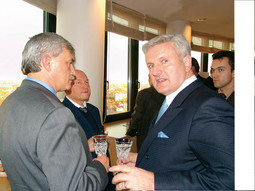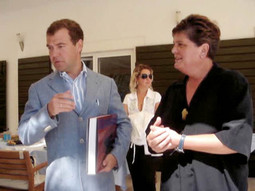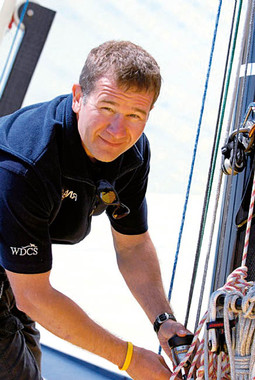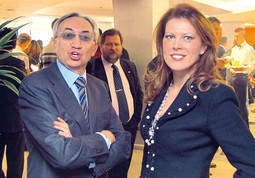Published in Nacional number 666, 2008-08-19
Agrokor’s boss and his Russian trump card
Todoric battles on
In its attempt to takeover the Russian retail chain Lenta from St. Petersburg, Agrokor’s key lobbyists are friends of former Zagreb Mayor Vlasta Pavic
 TODORIC, LUSKOV AND POLTAVCENKO first met in the Agrokor offices in 2003, thanks to then Zagreb Mayor Vlasta Pavic It would appear that the Croatian conglomerate Agrokor has a better chance than its competitors in the attempt to takeover the Russian retail chain Lenta. If it succeeds in its efforts, then that will be not only due to the best offer, but first and foremost to excellent political lobbying, as Nacional has learned from corporate sources close to influential Russian politicians.
TODORIC, LUSKOV AND POLTAVCENKO first met in the Agrokor offices in 2003, thanks to then Zagreb Mayor Vlasta Pavic It would appear that the Croatian conglomerate Agrokor has a better chance than its competitors in the attempt to takeover the Russian retail chain Lenta. If it succeeds in its efforts, then that will be not only due to the best offer, but first and foremost to excellent political lobbying, as Nacional has learned from corporate sources close to influential Russian politicians.
Agrokor has been carefully preparing for a possible expansion onto the Russian market for the past five years, and both Russian President Dmitri Medvjedev and close associate of former President Putin, Georgij Poltavcenko are very familiar with Ivica Todoric’s ambitions. Todoric met with Poltavcenko for the first time in 2003, thanks to then Zagreb Mayor Vlasta Pavic. Mrs. Pavic has excellent ties with some of the most powerful Russian politicians due to one mysterious friend whose identity she refuses to reveal. Upon his recommendation, last year she met with Medvjedev, who paid a short visit to Croatian with his family, which was also organized by Vlasta Pavic.
Her mysterious Russian friend is a very close associate of both Vladimir Putin and Georgij Poltavcenko, Putin’s authorized right hand man for central Russia. Furthermore, he is very close to the top ranks of the Russian Orthodox Church, which today plays a very important role in shaping Russian politics and has a massive influence on events in Russian society.
Thanks to this friend, during her mandate as mayor, Mrs. Pavic succeeded in developing excellent relations with her Russian counterpart Jurij Mihajlovic Luzkov and with Georgij Poltavcenko. During her mandate, Luzkov paid three official visits to Zagreb, while Poltavcenko paid two visits. During 2003, these men brought a 40-member delegation of distinguished Russian entrepreneurs, bankers and investors to Zagreb. At that time, Vlasta Pavic brought Luzkova and Poltavcenko to Ivica Todoric, the CEO of Agrokor. As an experienced businessman, Todoric immediately recognized the opportunity presented to him at this meeting. He informed the men about the Agrokor company, and even then announced his ambitions to expand operations to outside of the former Yugoslavia in the near future. At that meeting, the men discussed two issues: the possibility of Agrokor to invest in Russian agriculture, and their possible acquisitions in Russia when the conditions were met. Meanwhile, another meeting happened.
Stipe Tojcic, then Zagreb Deputy Mayor responsible for the economy, together with Ante Todoric, hosted part of the Russian delegation in the company Konzum. At that level, the delegation learned a great deal of useful information about Konzum, and about Agrokor’s orientation in agriculture. Not much time was needed before Dmitrij Medvjedev, then Russian Deputy Prime Minister responsible for strategic projects including education, health care, social policy and agriculture, was informed of the meeting. After these first meetings, Todoric paid a visit to Russia, where he continued to develop an initiative for a possible strategic expansion of his group. In fact, from this first meeting, Todoric was just waiting for the right moment to knock on the door of Russia’s massive market.
 NEAR ZADAR Russian President Medvjedev spent his summer vacation with his family in Croatia in 2007, organized by Vlasta Pavic He got his chance this summer, when partners owning the Russian retail chain Lenta decided to sell, due to a difference in opinions. This is a large retail chain seated in St. Petersburg with 31 hypermarkets and revenues of US .56bn in 2007. Agrokor applied as a candidate in the takeover of this company, even though shortly before it had failed in its bid to takeover the Turkish retail chain Migros.
NEAR ZADAR Russian President Medvjedev spent his summer vacation with his family in Croatia in 2007, organized by Vlasta Pavic He got his chance this summer, when partners owning the Russian retail chain Lenta decided to sell, due to a difference in opinions. This is a large retail chain seated in St. Petersburg with 31 hypermarkets and revenues of US .56bn in 2007. Agrokor applied as a candidate in the takeover of this company, even though shortly before it had failed in its bid to takeover the Turkish retail chain Migros.
Many claim that the Lenta takeover is an impossible task for Agrokor, as its competitors in the bid are the world’s largest retail chain Wal-Mart, the European retail leader Carrefour of France, Germany’s Metro and several other strong global companies and investment funds. Agrokor, however, believes that its organizational and managerial competence in retail are its trump card in opposition to others interested in buying out Lenta. Proof that Agrokor has a chance was seen in early August, when Todoric’s conglomerate passed through to the final round in the takeover, together with Wal-Mart, Carrefour and Kesko of Finland. Unofficial estimates say that the remaining candidates will offer between .4 and 2 billion.
The economic analysts at Hypo Alpe Adria Bank recently assessed Lenta’s value at 880 million euro, without takeover premiums. They assessed that Agrokor is capable of independently taking over Lenta, as Agrokor is valued at 1.3 billion euro, based on a 110 million euro share (8.3%) that the European Bank for Reconstruction and Development invested in the conglomerate in 2006. The remaining candidates have until early September to give their final bid for the takeover of 89% of Lenta, as the remaining 11% is owned by the European Bank for Reconstruction and Development (EBRD). There are many factors that will come into play in deciding the final winner of the bid, as Nacional has learned from well informed business sources. Some even claim that Agrokor could be benefitted by the fact that, like Lenta, it is part owned by the EBRD.
Some claim that the US company Wal-Mart is certainly not aided by the increasing tensions in the political relations between the US and Russia over the Georgia issue. In normal market economies, and especially in the case of the sale of a private company, the most important factor should be the level of the financial bid. However, in Russia, this need not necessarily be so, for there the political influence on some business processes considered to be of strategic importance can be very significant.
 OLEG ZEREBCOV, founder of Lenta and today controls 36.4% of the company, while 35% is owned by American August Meyer Ivica Todoric is very aware of this corporate-political context. Therefore, it should be no surprise that he has invested significant efforts in discrete communications with influential Russian politicians, sometimes on his own, and other times with the help of the excellent corporate advisors he has taken on. In recent weeks, these informal but intensive contacts have continued. This month, another meeting is planned between Agrokor and Georgij Poltavcenko. There were some indications that could spend a part of his vacation in a discrete visit to Croatia, as Dmitrij Medvjedev did last year, and Agrokor has taken all the necessary steps to ensure that Poltavcenko and Todoric met at that time. However, Nacional has learned from sources close to Poltavcenko that his plans have changed in the meantime, and he will likely not visit Croatia this year.
OLEG ZEREBCOV, founder of Lenta and today controls 36.4% of the company, while 35% is owned by American August Meyer Ivica Todoric is very aware of this corporate-political context. Therefore, it should be no surprise that he has invested significant efforts in discrete communications with influential Russian politicians, sometimes on his own, and other times with the help of the excellent corporate advisors he has taken on. In recent weeks, these informal but intensive contacts have continued. This month, another meeting is planned between Agrokor and Georgij Poltavcenko. There were some indications that could spend a part of his vacation in a discrete visit to Croatia, as Dmitrij Medvjedev did last year, and Agrokor has taken all the necessary steps to ensure that Poltavcenko and Todoric met at that time. However, Nacional has learned from sources close to Poltavcenko that his plans have changed in the meantime, and he will likely not visit Croatia this year.
Despite this, just days ago Jutarnji List released the news that Poltavcenko was to be Todoric’s guest at his summer residence at Rogoznica near Sibenik. The journalist called upon sources close to the Agrokor management, who had told him that the relations between Todoric and Poltavcenko were very friendly, and that the Russian official was so open and direct that it was no problem for him to fly out to Croatia after a telephone invitation. Those close to Poltavcenko have confirmed for Nacional that, even if these claims are correct, then someone close to the Agrokor management slightly exaggerated the description of the relations between Todoric and Poltavcenko. Their relations are friendly, but Poltavcenko certainly would not come to Croatia after a telephone call from Todoric. Some even suspect that this information was released in order to harm Agrokor in its takeover bid.
Regardless of the outcome of this transaction, Ivica Todoric will certainly not give up in his intent to make Agrokor and Konzum a globally relevant retail chain. In early summer, Todoric held an important meeting with his closest associates, at which they made some strategic decisions concerning the continued expansion of Agrokor.
In Croatia, Agrokor intends to maintain his dominant position in its core business. This refers to Konzum, Ledo, Zvijezda and Jamnica. Agrokor will also continue to develop other profitable projects in Croatia. It has been decided that Agrokor will invest all its efforts in order to develop into the strongest regional company and beat out its regional competitors Delta from Serbia, Mercator from Slovenia and other foreign retail chains, who believe that their position will be strengthened by Croatia’s accession to the EU. In that context, Agrokor believes its expansion onto the Serbian market is very important, and it also plans to expand onto the Macedonian market, as this is considered by Agrokor to be not only an important retail market, but also an important buying station for fruit and vegetables. Macedonia would be a base for the continued expansion towards Albania and Kosovo. However, Kosovo is currently not a priority for Agrokor, due to the sensitive relations between Kosovo and Serbia.
At this meeting, a new analysis was made of the possibility of establishing ties with Serbia’s Delta. The financial institutions responded well to such an idea, but Agrokor decided that this was not possible due to realistic reasons: it was difficult to estimate what each company was worth in comparison to the other, and even more difficult to establish who would run the company in the future and with what authorities, considering that the top guns in both Delta and Agrokor are still in their best shape. That topic of discussion was soon closed and an economic agreement signed that Agrokor and Delta would not enter into any expansion based conflicts in the region.
 At the meeting, it was again decided that stepping out of the region was the top priority. The first attempt was made with Migros from Turkey. Agrokor attempted to takeover this company with the Blackstone investment fund. The due diligence of Migros showed that the maximum price to pay for Migros was US .9bn. Blackstone did not want to pay the US$ 3.3bn, and so Agrokor failed to take its first big step out of the region. Later, when the price of Migros fell due to the ensuing global economic crisis, Agrokor was not overly disappointed with its failure in the takeover.
At the meeting, it was again decided that stepping out of the region was the top priority. The first attempt was made with Migros from Turkey. Agrokor attempted to takeover this company with the Blackstone investment fund. The due diligence of Migros showed that the maximum price to pay for Migros was US .9bn. Blackstone did not want to pay the US$ 3.3bn, and so Agrokor failed to take its first big step out of the region. Later, when the price of Migros fell due to the ensuing global economic crisis, Agrokor was not overly disappointed with its failure in the takeover.
Not long afterwards, already in the next market opportunity, Agrokor entered into the battle to takeover Russia’s Lenta. However, at this meeting, Todoric and his closest associates decided to pay very close attention to events on the Ukrainian market and markets outside Europe. Agrokor also intends to increase its presence on the US market, and to enter onto some markets in China. Agrokor’s managers have also started looking into the state of the retail market in Italy and Bavaria, as these markets will be particularly interesting once Croatia joins the EU. Agrokor is optimistic and have assessed that they have not had a single failed investment to date.
Therefore, regardless of their high level of indebtedness, they believe that the company is very healthy and will continue to expand to the very boundaries of its financial capabilities. Todoric is aiming to do this, primarily to prevent Agrokor from becoming a takeover target in the near future, before it succeeds in stepping out of the regional context. Whether or not the battle for Russia’s Lenta will succeed in removing these fears will be evident by year’s end.
Disagreement ends in sale
Lenta was established in St. Petersburg in 1993 by Oleg Zerebcov as a wholesale company aiming to supply the hospitality industry and small shops. Five years later, he began building hypermarkets and shops between 8 and 20 thousand square meters in size. At the end of 2006, Lenta opened the first hypermarkets in Siberia, in Novosibirsk and Astrahan. During 2004, the EBRD entered into the ownership structure of Lenta with a US m loan. To date, the bank has approved US 5m in loans to the company. The two largest shareholders, Oleg Zerebcov and American August Meyer, decided to sell off their shares due to a disagreement.
Related articles
Todoric to enter the energy market
Agrokor, Croatia's largest company in the retail and food industries is soon to enter onto the energy market. Just last month, the company… Više
Latest news
-
28.10.2010. / 14:15
'A profitable INA is in everyone's interest'
-
28.10.2010. / 09:38
Sanader’s eight fear SDP — Won’t bring down Government
-
21.10.2010. / 15:02
Interior Ministry turned a blind eye on Pukanic assassination
-
20.10.2010. / 09:34
Barisic could bankrupt HDZ




